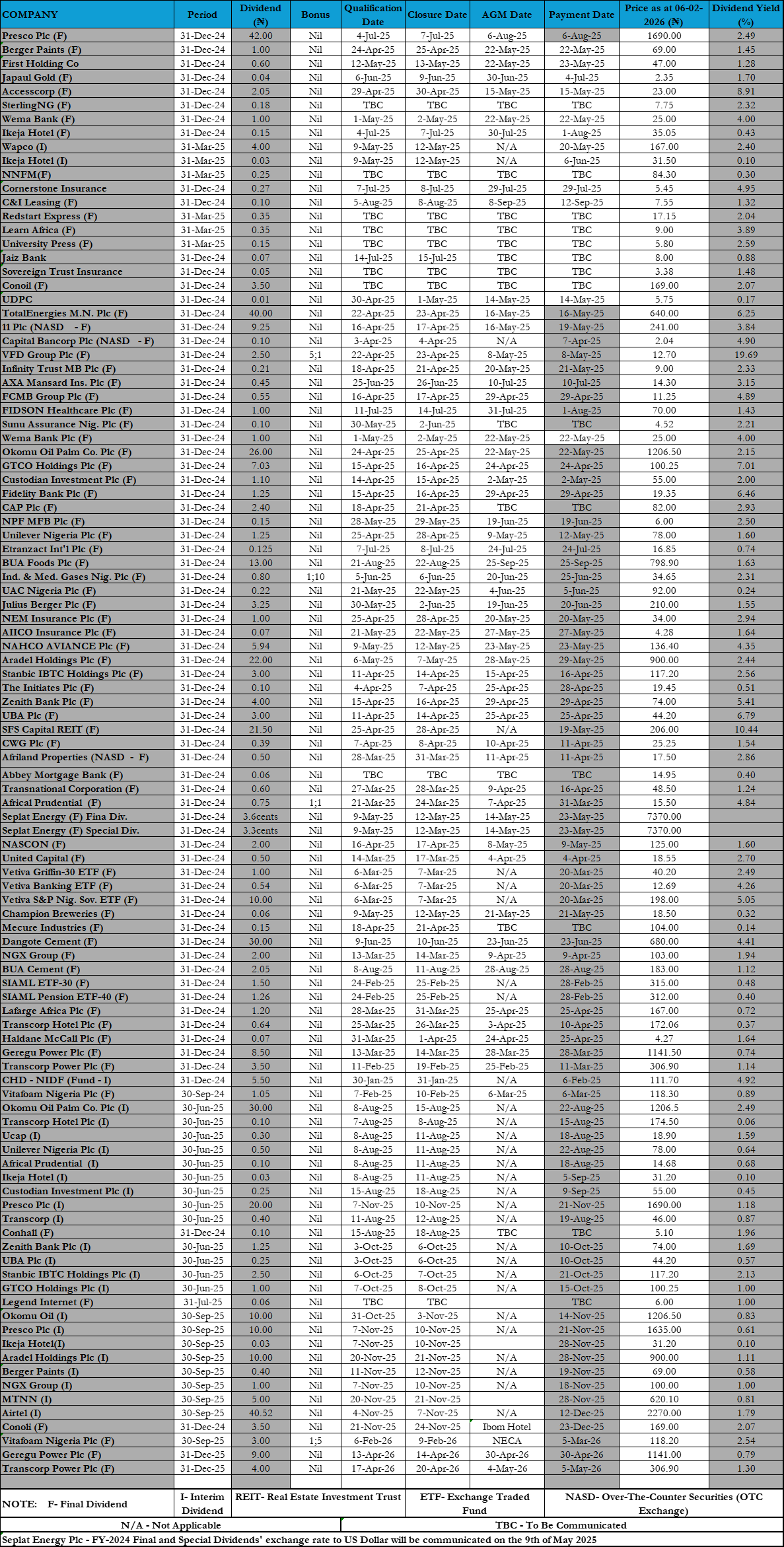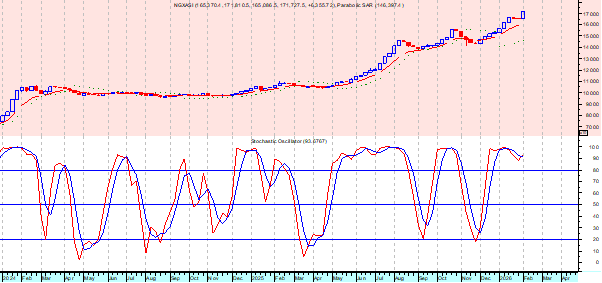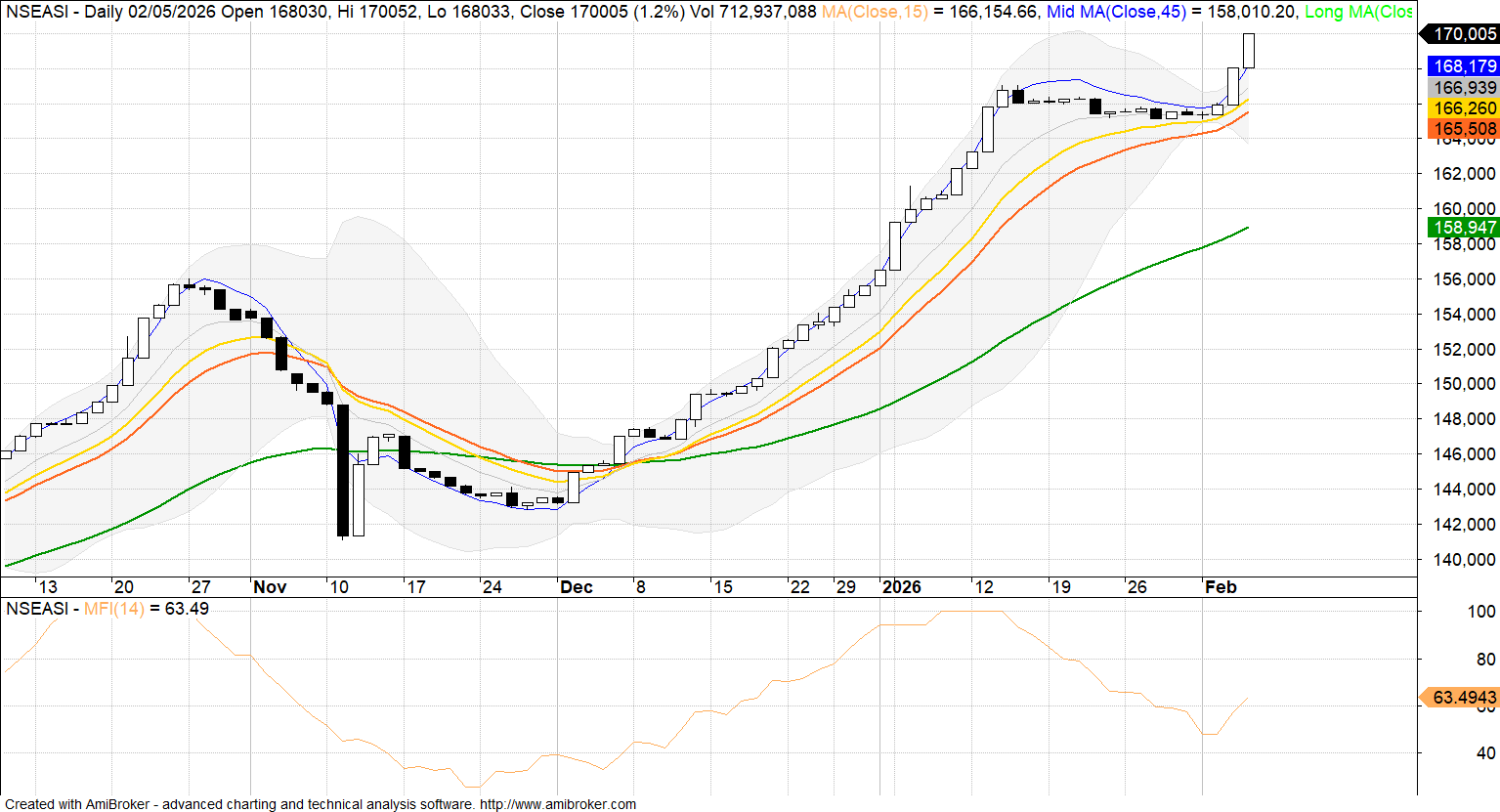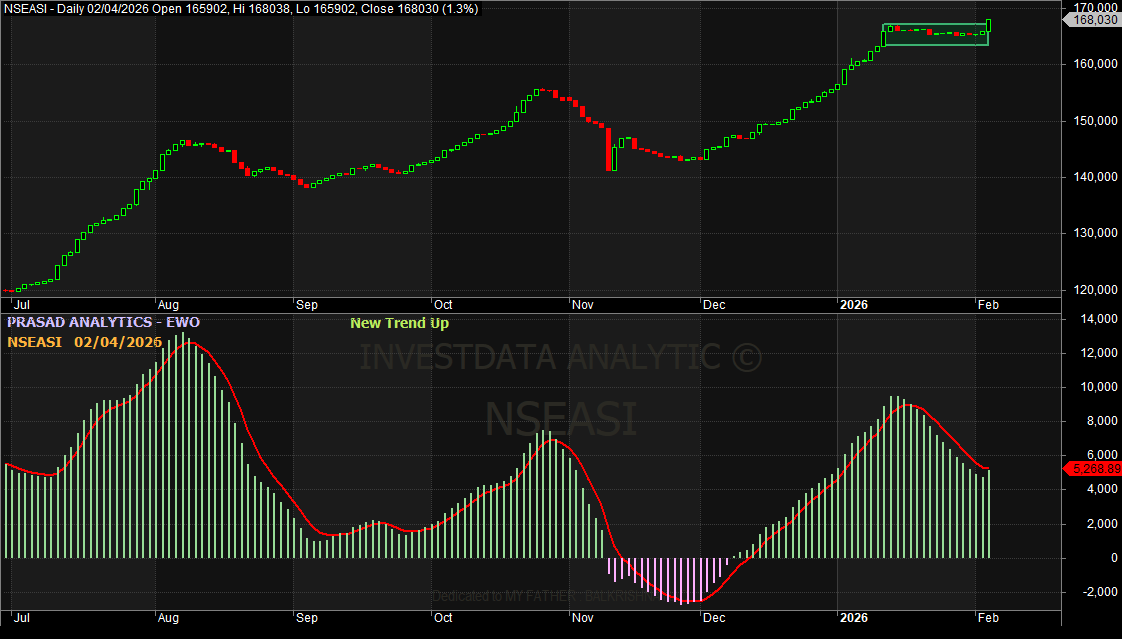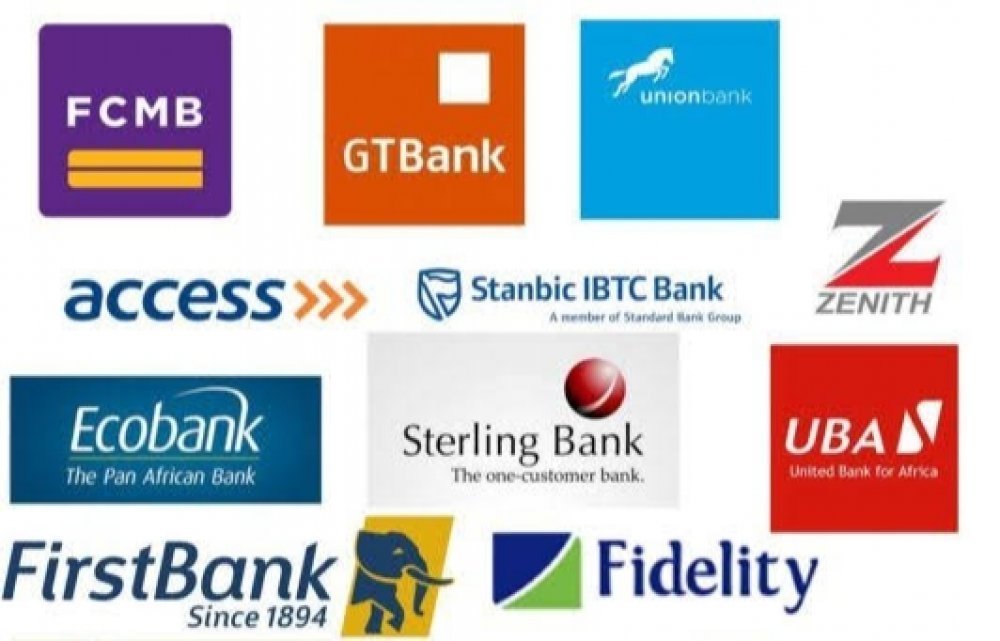
Market Roundup for February
It was a volatile and bearish February on the Nigerian Exchange, as the benchmark NGX All Share index halted four consecutive months of growth in the midst of high selling sentiment and oscillation. This is despite the bullish opening un January, being the post- election year that was short-lived by profit taking and selloffs in reaction to higher yield outlook in the fixed income market and the hawkish move of the central bank. The negative sentiment and mixed trend during the period was attributed to portfolio rebalancing and sector rotation that will continue into the peak month of earnings reporting season and dividend declaration, even as market fundamentals had changed. Looking at the negative performance by companies that have so far presented their audited results, a reflection of the gloomy and contracting economy.
This coincided with the aggressive borrowing of the government that had pushed fixed income yields northward through high OMO rates, Treasury Bills’ primary market auctions and FGN savings bonds Amid the persistent runaway inflation at 29.9% in January. There were also the rising economic headwinds and insecurity as protest has continue in different states of the nation on high cost of living and geometric rise in food items to imported inflation as a result of FX challenges that had led to everyday depreciation of the naira. Despite the ongoing geopolitical concerns over the Middle East conflict, Russia and Ukraine war, global inflation is cooling down and rates are unchanged in major economies of the world pointing to likely end of rate hike cycle for the matured market, while CBN in the bid to checkmate inflation and mop-up funds offered the last NTB auction at 17.5%, 18% and 19% respectively for 91-day, 182-day and 364-day tenor. Coupled with the latest rate hike of 400 bps to 22.75% from 18.75% had put a selling pressure on the equity space, even when the pullbacks or correction has created buy opportunities for discerning investors and the technical traders, as the market broke down the 100,000 psychological line during the month. The downtrend occurred on the back of profit taking and selloffs in the midst of lower traded volume when compared to transactions recorded in January, as early filers NB, Nestle and MTNN hit the market with negative numbers and no dividend for their shareholders, except for Seplat, Wapco, BUA Cement, Dangote Cement and Mecure that recommended dividend of $0.3, N1.90, N2.00, N30.00 and 15 kobo respectively.
During the month also, there were announcements of mixed economic data, ranging from the uptick in the January consumer price index, slowing expansion in Purchasing Managers’ Index at above 50 points, sustained GDP growth, showing that Q4 domestic productivity rose by 3.46%. This situation is expected to support stock prices, but a concern for investors due to the unclear policy direction of the fiscal and monetary authorities. This is in addition to the unstable crude oil production in the nation and oscillating oil prices in the international market, driven by weak global demand and high US inventories which support the relative stability in oil stocks and domestic economic recovery.
The seemingly stable external reserve and rise in crude oil price above the nation’s $75 per barrel budget benchmark are positive signs for the equity market, going forward, despite the ongoing portfolio realignments, due to the ongoing selloffs and volatility, expected higher yields in the fixed income market due to the recent rate hike.
With the expected influx of more audited earnings reports and high inflation in the new month, a mixed trend is underway as a result of profit taking, corrections and buying interests in dividend stocks. This is due to the relatively high dividend yields among blue-chips that had suffered losses in recent times, as well as growth stocks with strong earnings power which are becoming better and more attractive.
The NGX- All-Share index closed in the second month of the year on a negative note, as Thursday’s market rebound signaled strength and trend continuation that needs confirmation. The market expects more results inflow and is yet to respond to the few dividend announcements. As noted earlier, the audited scorecards of various listed companies released so far have given insights into what we should expect from sectors and individual stocks. The possibility of an uptrend is mixed, depending on the state of the 2023 full year corporate numbers amidst portfolio reshuffling and corporate actions.
In the 21 trading sessions of February, the NGX All-Share index recorded gains in 10 sessions and was down in 11, resulting in a cumulative 1.16% loss that cut the NGXASI year-to-date gain to 33.71%. This happened as the market corrected from its all-time high of 106,087.80bps, on change in trend, momentum and market fundamentals in the face of mixed company earnings performance and expected high dividend yields that will attract inflows to the equity market in the midst of rising inflation.
Specifically, during the month, the NGXASI fell by 1,174.20 basis points, closing at 99,980.30bps, after touching a low of 98,939.56bps for the month, compared to the 101,154.50bps at which it opened, on a selling sentiment. This impacted negatively on the index and stock prices, pushing them down to breakdown various support levels and psychological lines. Market capitalization was down by N650bn, closing at N54.71tr, from N55.36tr, representing a 1.17% value loss. The month’s total ‘sell’ volume was 85% and buy position stood at 15%, halting the four-month bull transition, while volume index for the period was 1.09.
Volume traded for the period was down by 54.74%, at 8.73bn shares, as against 19.29bn units in the preceding month, just as market breadth for the month was negative with losers outnumbering gainers in the ratio of 88:16 pulling the market down month as liquidity flowed into safer asset classes with low risk due to factors mentioned above.
Bearish Sectorial Performance

Performance indexes across the sectors were mixed, with the NGX Consumer Goods, Mainboard and Energy closing 16.45%, 5.73% and 4.14% higher respectively, while the NGX Industrial Goods index led decliners, losing 13.33%. As shown in the chart below, the NGX Premium, Insurance, Banking and NGX 30 indexes weighed on the market the most during the month, more than the general market, revealing investors’ negative sentiment and selloffs among traders, as the market’s Price-To-Earnings Ratio is below 15x.
Best And Worst Performing Stocks For February
The best-performing stocks for the month under review were predominantly low and large caps across the Energy, Consumer goods, Insurance and others, led by Juli Pharmacy, which gained 478% as a result of the market sentiment and proposed primary activities, despite the shaking fundamentals. It was followed by Geregu’s 97.37% gain, and the 39.77% notch by BUA Foods. Tripple Gee climbed 32.80% up, on market forces and seeming improvement in its earnings; just as Cornerstone Insurance chalked 27.27%; among others.
Best Performing Stocks in February
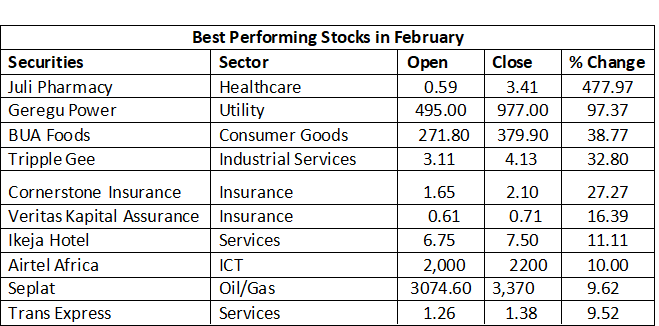
Source: Investdata Research
The worst performing stock for the month was Morison Industry, which lost 55.33%, amidst profit taking and market forces; followed by Eterna’ 47.03% drop due to its unimpressive earnings and profit taking. Linkage Assurance’s share price declined by a further 43.85% showing display of selloffs and profit booking. Guinea Insurance and SterlingNG lost 36.67% and 35% respectively.
Worst Performing Stocks in February
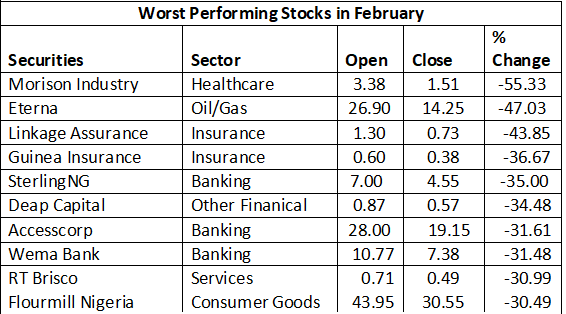
Source: Investdata Research
Technical View
The NGX’s Index action has formed a topping reversal chart pattern to reverse the bull run on a less than average traded volume and negative advancers/decliners line. The market pulled back from its peak of 106,087.8 points on profit taking and selloffs that was intensified after the rate hike by CBN. As the index pullbacks to breakdown some psychological lines and strong support level of 100,000points ahead of more audited financial reports. At the same time, it is trading above its shortest moving average, 20DMA, 50DMA and 200 DMA on the monthly time frame, to reveal strength amidst selling sentiments and low traded volume.
The trading patterns and momentum, going forward, are likely to change as investors react to the expected audited full-year earnings news, portfolio rebalancing and repositioning, with dividend news and oil price oscillating. The seeming reversal at 99,980bps level needs to be confirmed on Friday and next week, as the index’s action try to go above 100,000 mark which keep the market relatively strong.
Market technicals for the month were negative and mixed, a situation expected to continue in the new month, that is the peak of the earnings reporting season.
Market Outlook
Mixed trend is expected to continue in the new month, even as the market outlook remains mixed and dicey, due to the prevailing weak earnings, or pullbacks that may happen in the new month as a result of selloffs. The anticipated correction in the new month, or after, will strengthen recovery. Despite the high inflation, insecurity and headwinds opportunities, as good dividend payout and recovery oil prices will further boost market fundamentals.
But investors at this point should not be greedy. Instead, your decisions must be guided by investment goals and trading strategies, even as inflow of funds into the equity assets are mixed due to higher rates in money market is likely to continued even as we look forward to MPC meeting in the new month.
Again, the current pullbacks offers trader’s opportunities to position for the short term, while investors should target fundamentally sound, and dividend-paying stocks for possible dividend income and capital growth.
Ambrose Omordion
CRO|Investdata Consulting Ltd
info@investdataonline.com
info@investdata.com.ng
ambrose.o@investdataonline.com
ambroseconsultants@yahoo.com
Tel: 08028164085, 08032055467








